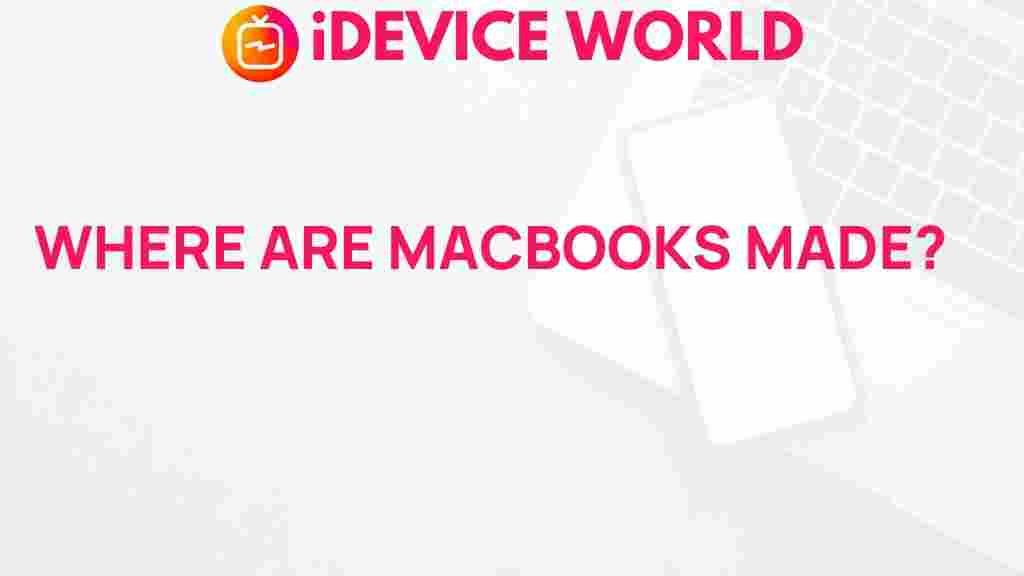Unveiling the Mystery: Discovering the Origins of MacBook Production
The MacBook has become an iconic symbol of innovation and design in the world of technology. As we delve into its origins, we will uncover the fascinating journey of how this remarkable device came to be, the key players involved in its production, and the impact it has had on the tech industry. Understanding the history behind the MacBook not only enriches our appreciation for this product but also highlights the complexities of modern manufacturing processes.
The Birth of the MacBook
The MacBook was introduced by Apple Inc. in 2006, replacing the iBook and PowerBook series. It marked a significant shift in Apple’s approach to portable computing, combining sleek design with powerful performance. The first generation of MacBooks featured Intel processors, which was a crucial move for Apple, allowing for enhanced speed and efficiency.
Key Players in MacBook Production
Several key players contribute to the production of the MacBook, ranging from engineers to manufacturers. Here’s a breakdown of the main contributors:
- Apple Inc.: The company designs the MacBook, focusing on aesthetics, usability, and technology.
- Foxconn Technology Group: One of the largest electronics manufacturers globally, Foxconn is a key assembly partner for Apple products.
- Samsung and LG: These companies provide essential components such as displays and memory chips.
- Intel: Supplies processors that power MacBook models.
The Design Process
The design of the MacBook involves a meticulous process that blends form and function. Here’s a step-by-step look at how the MacBook is designed:
- Conceptualization: Designers brainstorm ideas, focusing on user needs and market trends.
- Prototyping: Early models are created to test different features and designs.
- User Testing: Feedback from potential users is gathered to refine the design.
- Final Design: The design is finalized, incorporating feedback and technological capabilities.
- Manufacturing Specifications: Detailed instructions for production are developed.
Manufacturing Locations
MacBooks are manufactured in several locations worldwide, primarily in Asia. The following countries play a vital role in the manufacturing process:
- China: The main hub for assembly, with facilities owned by Foxconn and other manufacturers.
- Taiwan: Home to many component suppliers, including chip manufacturers.
- South Korea: Provides advanced technology components like displays and memory chips.
Understanding the Supply Chain
The supply chain for MacBook production is intricate, involving various stages and stakeholders. Here’s a simplified view of how the supply chain operates:
- Raw Materials: Sourced from different parts of the world, including minerals for electronics.
- Component Manufacturing: Various companies produce specific components like processors, memory, and displays.
- Assembly: The assembled parts are sent to manufacturing plants, primarily in China, for final assembly.
- Quality Control: Each MacBook undergoes rigorous testing to ensure it meets Apple’s high standards.
- Distribution: Once assembled, MacBooks are shipped globally to retailers and customers.
Environmental Impact of MacBook Production
As we unveil the mystery of MacBook production, it’s essential to consider its environmental implications. Apple has made significant strides in sustainability, implementing initiatives to reduce its carbon footprint:
- Recycling Programs: Apple encourages recycling of old devices through trade-in programs.
- Use of Recycled Materials: Increasingly, Apple is using recycled aluminum and other materials in MacBook production.
- Renewable Energy: Apple’s manufacturing partners are moving towards renewable energy sources to power their facilities.
Troubleshooting Common MacBook Issues
Even with its advanced design and manufacturing processes, users may encounter issues with their MacBooks. Here are some common problems and troubleshooting tips:
1. Slow Performance
If your MacBook is running slowly, try the following:
- Close Unused Applications: Too many applications running simultaneously can slow down performance.
- Check Storage Space: Ensure you have enough free space on your hard drive.
- Run Disk Utility: This can help fix issues with your hard drive.
2. Battery Life Issues
To improve battery performance:
- Reduce Brightness: Lowering the screen brightness can extend battery life.
- Check Battery Health: Monitor battery health using system preferences.
- Avoid Extreme Temperatures: Keep your MacBook within recommended temperature ranges.
3. Connectivity Problems
For Wi-Fi or Bluetooth issues:
- Restart Your MacBook: A simple restart can resolve many connectivity problems.
- Reset NVRAM: This can help with various hardware-related issues.
- Update macOS: Ensure you’re running the latest version of the operating system.
Future of MacBook Production
The future of MacBook production looks promising, with advancements in technology and manufacturing processes. Here are some trends to watch:
- Increased Automation: More automated processes will streamline production and reduce costs.
- Focus on Sustainability: Continued efforts to make production more environmentally friendly.
- Innovative Materials: Research into new materials that enhance durability and performance.
Conclusion
The journey of the MacBook from concept to production is a testament to innovation, collaboration, and dedication. Understanding its origins enriches our appreciation of the device we often take for granted. As Apple continues to evolve its design and manufacturing processes, the MacBook will undoubtedly remain a leader in the technology space.
For more information on MacBook features and specifications, check out the official Apple website. To explore more about technology trends and innovations, visit TechRadar.
This article is in the category News and created by iDeciveWorld Team

1 thought on “Unveiling the Mystery: Discovering the Origins of MacBook Production”